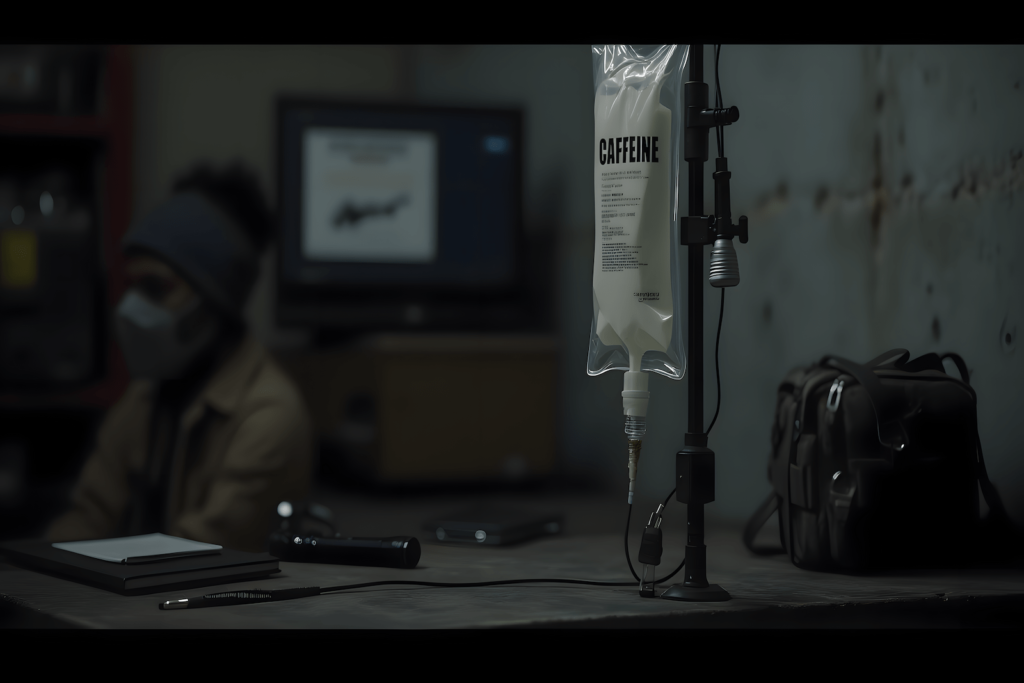Some links on this page are Amazon affiliate links. If you choose to buy through them, HealthyForge may earn a small commission at no extra cost to you.
These links only appear where tools or everyday support items naturally fit the topic. No paid placements. No miracle cures.

Most people treat caffeine like a daily right. Morning coffee. Afternoon coffee. Energy drink. Repeat.
But caffeine isn’t energy. It’s a loan. And eventually, that loan comes due with interest.
Let’s break the cycle. Here’s how to use caffeine like a weapon not a wheelchair.
The Lie: “I Need Caffeine to Function”
You don’t. What you actually need is:
- Electrolyte balance (you’re likely depleted and here’s the proof)
- Proper sleep architecture (fix your cave)
- Cortisol and adenosine cycling that isn’t wrecked by late-day stimulants
Caffeine masks exhaustion. It doesn’t fix it. And if your intake keeps going up? You’re not more productive. You’re just numbing out the signals your body is begging you to listen to. The crash isn’t about caffeine, it’s about unbuffered stress. I swap my second cup for Rhodiola or L-theanine when the edge gets sharp but I still need focus.
What Actually Happens in Your Body
Caffeine:
- Blocks adenosine receptors, which normally signal sleep pressure
- Spikes cortisol, especially if taken early or under stress
- Halves its life every ~6 hours but that’s half-life, not full clearance
- Delays deep sleep even when taken 6–10 hours before bed
So that 3 PM “pick-me-up” you thought was harmless?
It’s why your 11 PM sleep is shallow, and your next morning feels like trash.
Tactical Caffeine Use (Real Systems)
1. Delay Caffeine Until 90–120 Minutes After Waking
Let natural cortisol wake you first. Taking caffeine too early blunts your body’s own rhythm. An insulated mug helps slow consumption and stabilize temperature, which matters more than people think when you’re trying to avoid unconscious overuse.
2. Use It Pre-Task, Not Pre-Sleep
Caffeine is for execution not survival. Time it before deep work, heavy lifts, or driving, not before zoning out on Netflix. Decaf coffee lets you keep the ritual without pushing adenosine suppression or wrecking sleep when stimulation isn’t the goal.
3. Dose Strategically
Stay below 200mg per sitting unless you’re planning for:
- A fasted workout
- A brutal deadline
- A planned crash + nap cycle (aka coffee nap)
A coffee scale removes guesswork and prevents accidental over-dosing, especially when tolerance masks how much you’re actually consuming.
4. Cut It Off 8 Hours Before Bed (Minimum)
Earlier if you’re sleep-sensitive. If you need a night booster, go with electrolytes + light. Not more caffeine.
5. Don’t Stack It With Stress
Taking caffeine during burnout = pouring gasoline on a hormone fire.
If you’ve already got migraines or cortisol crashes, start here.
⚠️ “But I Can Still Sleep After Coffee” Isn’t a Flex
You might fall asleep after coffee, but that doesn’t mean you’re getting true recovery.
Caffeine can still:
- Kill deep sleep stages (you don’t feel it, but your body does)
- Blunt adenosine reset, meaning you wake up foggy
- Spike overnight cortisol, keeping your nervous system on edge
This usually happens to:
- High-stress workers who’ve built a tolerance to exhaustion
- Night owls who’ve normalized dysfunction
- Anyone using caffeine as a crutch instead of a performance tool
If you think you’re the exception, test it:
- No caffeine after 2 PM for 3 days
- Compare sleep quality and mental clarity the next morning
Just because the lights go out doesn’t mean your body’s actually recovering.
Cycle It, Don’t Depend on It
- Use caffeine-free days at least twice a week
- Try weekend resets to recalibrate your baseline
- Don’t push through exhaustion, fix the source
When fatigue is really electrolyte depletion, a simple electrolyte powder often does more than stacking more caffeine.
Energy Without the Crutch
Want real energy? You need system support, not more stimulation:
- Fix your electrolyte rhythm
- Reset your sleep protocols
- Stop frying your posture and eyes from bad work setups
Bottom line:
Caffeine isn’t evil. But you’re not built to be a machine running on gas station coffee and hope.
Use it as a tool. Not a life raft.
Not every cup of coffee needs to be strategic. If you’re interested in coffee as a craft rather than a tool, the French press offers a different kind of engagement entirely one where the process matters more than the outcome.

